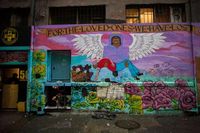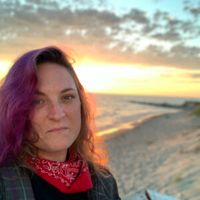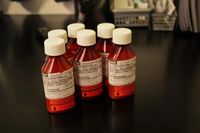For about six years, I worked as a frontline shelter support worker, case manager, and harm reduction educator in two very different provinces. And now, even after two years of leaving frontline harm reduction work and returning to school, I’m still not ready to go back, and I may never be.
I distinctly remember when the overdose crisis really started escalating in British Columbia, even before it was declared a public health emergency. It was late 2014 and early 2015 when the frequency and intensity of overdoses was getting out of control in Victoria. I was working consecutive ten-hour day shifts over the holidays. Sometime early in the morning on Christmas Day in 2015, I remember we responded to 4 overdoses in just under one hour. Back-to-back, one after another. It felt like every time we checked, another person was found experiencing an overdose in our shared bathrooms, which are linked to the largest, most frequently used common room at the co-ed shelter. There were three more overdoses later that evening. Luckily, that day we were able to bring everyone back.
Other days, we were not so fortunate. A young man, in his late twenties, died alone in his car after overdosing on fentanyl-laced heroin. Staff members performed rescue breathing and administered multiple doses of Naloxone, but it was already too late. He had parked just outside the shelter, less than 15 meters away from help.
We started setting up a table in the corner of the reception space that we used to display a picture, some flowers, and any other significant items to honour the most recent person we’d lost. We used to leave it there for a week or two, so people could leave messages, write poems, share memories. Then we’d collect all the messages and send them to their loved ones, if we had any kind of contact information.
But overdoses were killing people so frequently that there were often multiple names and pictures being honoured on the table. And of course, people experiencing homelessness died from all sorts of other reasons, almost always prematurely. One service user I worked with had successfully completed four months of a rehabilitation program when she died at age 43. While going up a set of stairs, she had a grand mal seizure, hit her head, and died shortly after. Another service user jumped off the boardwalk and drowned himself in the icy-cold Pacific Ocean at the age of 44. Another service user, a young man in his twenties, committed suicide in his transitional shelter unit and was found by my colleagues during an overnight shift. Another service user slowly drank himself to death and died, one year before he was old enough to claim his pension. Another service user died from an untreated form of lung cancer that killed her within three months of her diagnosis. I could go on, but I won’t, because I just can’t anymore.
I pushed these realities away for so long and denied that my experiences were impacting my physical and mental well-being. But denial and avoidance can only last so long. The trauma and grief all catches up to you eventually. Ultimately I realized I was suffering from both direct and vicarious trauma. Day-in, day-out, consistently lacking resources while trying to serve people in emergency and crisis situations. It takes a serious toll both physically and emotionally, and it can cost you your health and your soul.
My symptoms were obvious to everyone around me, yet I was blinded. Persistent physical symptoms like constant fatigue, recurring colds, sinus infections, and chronic body aches. Not to mention the mental and emotional symptoms – anxiety, depression, sleep disturbances, increased drug use, heightened sensitivities to sounds, and difficulties with interpersonal relationships. For me to eventually connect the dots, it took co-workers who were willing to share and reflect on their observations with me. My experience has been one of profound and compounded grief, a grief that takes time to heal, a grief so subtle and deceptive that it sneaks up on you when you’re least expecting it. A grief that will never truly heal as long as people continue dying from preventable overdose deaths.
“My experience has been one of profound and compounded grief, a grief that takes time to heal, a grief so subtle and deceptive that it sneaks up on you when you’re least expecting it. A grief that will never truly heal as long as people continue dying from preventable overdose deaths.”
Taking a prolonged break from the frontlines of harm reduction service provision was one of the most difficult decisions of my life. It was so painful, so horrendously heart-wrenching. It was this overwhelming feeling of caring so much, of loving so deeply, of wanting to do so much more–all while simultaneously realizing you just can’t. Not anymore. At least not right now, in these moments, at this time. Your heart breaks, aching to again serve those whom you love, lost, and worked so closely in partnership with.
It has now been over two years since I’ve worked in any true harm reduction setting. A part of me profoundly misses this frontline work. The sense of getting something tangible done at the end of the day, of helping someone just make it to the next day. The meaningful and authentic interactions with service users, co-workers, and community members. But I’m still grappling with these losses.It is a collective grief, one shared by community members, frontline workers, and anyone else impacted by the ongoing overdose crisis and the war on people who use drugs.
“It is a collective grief, one shared by community members, frontline workers, and anyone else impacted by the ongoing overdose crisis and the war on people who use drugs.”
Until we address and dismantle the harmful drug policies that are ultimately responsible for the deaths of thousands to overdose, people will continue to die, and we will continue to grieve. We are treading water in a well made toxic by drug criminalization, perpetually traumatizing people who use drugs, frontline workers, and our communities.



